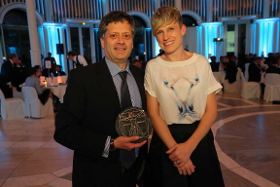Gary, tell us your story: What’s the idea or the aim of People’s Voice Media, and how did this idea develop?
The aim of People’s Voice Media is really to give a voice to people, to listen to their stories, and to learn from their stories. In this way we create conversation, we create dialogue between people with a view of how to improve your situation or the services that you are providing.
Our not-for-profit organization has been in existence since 1995; I joined in 1999. We started off with gathering community information and developing community information. Over the years we migrated. What we saw was the potential of the web. What we identified was that the “www” was the „world wide web“. For us, this was a bit too remote. So we created this notion of “cww”, which is “community wide web”: community based information resources with very heavy participation by communities themselves.
Then, probably in about 2008, we developed this notion of community reporters. Because we recognized this: Loads of people have stories. And now for the first time, we gave those people the opportunities to tell their stories in a way that they want to tell them: through blogging, podcasting, videos, audio or writing. We wanted to give validity, we wanted to say: your story is important. But we also wanted to say: you can say it in which way you want to say it. So that is really how the community reporter program was born. And what we also decided was that we are not going to be journalists; we are not interested in news.
So Community Reporting isn’t about news. It is about people actually. It is about stories of people and stories of individuals. What we recognized then was that those stories are not that dissimilar. They are in fact remarkably similar to each other. So if you put that story and that story together, you got really interesting picture. And it is a picture that the media don’t often portrait. We wanted to say the good things about communities, the good things about society, the good things about people, the good things about organizations, which we never said. And all this great knowledge and information it was all hidden. And for us, it is very much ongoing story. It is not just a snapshot.
But we also said: We don’t come in and interpret your story for you. We want you to create the story that you want to create. And for that we will train you and support you. And that’s what community reporter program is about: it is all almost like accrediting the stories, crediting as well, but validating the stories, and to say that you are legitimate.
You were awarded with the Leonardo Award in the category „Crossing Borders“. So what are the borders you have crossed?
The European ones really. We started in Manchester, and now in 2013 we are operating in six countries across Europe. And now we are having discussions with some people in Canada and America, and also potentially Africa. So there are no boundaries to any of us. Everyone wants to tell their own story. And what is really intriguing to me is the good-news-story. For example, when we talk about Africa, the perception of Africa is about poverty. So that is not the story I want to tell. The story I want to tell is the triumphs, is the good news. Our model is: Tell us the good things about yourself, tell us the good things about your communities. And that’s why it is crossing borders.
So we are not done yet. What we really have to do is have young people in Ethiopia talking to young people in Australia, talking to young people in Budapest, talking to young people in Germany talking to young people in the UK. That is really what we are trying to get to: to create a sort of networks so that you can create conversations. If you create conversations, and people get to know more about who you are, where you are from and your story, that can only be good. “I am learning from you”, that is actually, what we really want to achieve.
Your eulogist at the Leonardo award ceremony and Leonardo Ambassador Prof. Dr. Günther Koch emphasized: "Those responsible for corporate learning can learn a great deal from this somewhat different approach, namely how to involve their employees and to get them to participate actively.” What is there about the connection of corporates and communities?
So for us, what becomes really intriguing when we talk about People’s Voice Media is that it is really about voice and communities. But one of the things that really came out of me for the Leonardo Award, why not create an Employee’s Voice Media and really develop the stories of people inside organizations, find out how they feel about their organization. But it that way, we can also release their innovation inside amd can we make it a knowledge management system.
So how do you release that potential? So we think, we could create an Emploee’s Voice Media with Community Reporters inside companies who are talking about their experiences over a long period of time. The employees are all Community Reporters, they are collecting the stories of themselves, they are collecting the stories of their peers, they are collecting the stories of their organizations.

